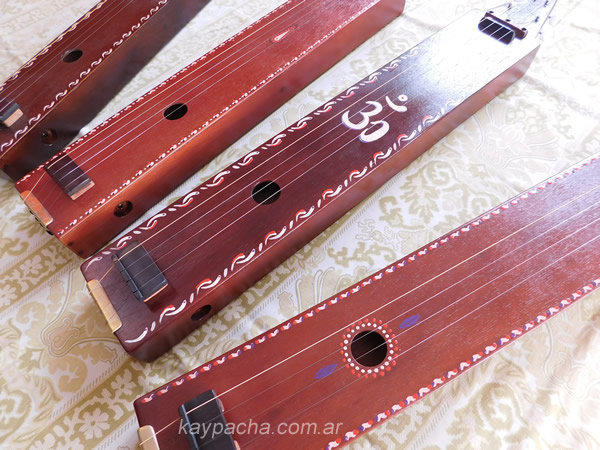The original instrument "Tampura", "Tanpura" or "tambura", is built on a gourd resonance box as was the old Vina and a hollow wooden neck where its end supports the strings through 4, 5 or 6 wooden pegs. This instrument has a peculiar sound and during its execution providing a mantric atmosphere, a constant circular sound and plays an important role in the music of the Hindustani system such as the Carnatic (in North and South India respectively) which guides and orients the musicians as a harmonic base so that they can freely sing or play other instruments having the same harmonic reference point.
EsThis "TAMPURIBOX" "TANPURI BOX" "TAMPURA BOX", is a reduced version for easy transport of the same, built with different woods in order to provide as faithful as possible the original sound of the Tampura.
We have built this Tampuri Box with 4 strings (which is perhaps the most common), although there are 5 or 6 strings as well.
The strings, in this case, are acoustic guitar which allows you to get them in any music store, the design of these tampuriboxes with this type of strings offers a sound equal to the original tampuras from India, offering this particular and characteristic sound of the entire guitar. music of that country.

We have built the main bridge, Jivari or Jawari, in ebony wood, it is where the strings rest on the resonance box which produces this buzz or effect so particular of the metal stringed instruments of India, such as the traditional Tanpura, Sitar , Rudra Vina, Saraswati veena, etc.
Occasionally, a fine silk thread is used, placed perpendicular to the string, between the string and the bridge or Jawari in such a way as to increase or reduce this typical tampura hum.
We have used guitar pegs in such a way as to simplify and improve the old wooden peg tampura, so there is no need to use microtuners on the strings anymore (as in the original Tampura), these pegs offer a precise and exact tuning in the tuning of each string.
Usually the strings are tuned in the following way: 5th, Octave, Octave, 1st tonic, (5-8-8-1) for example to accompany a Sitarist it could be G2, C3, C3, C2, or also G#2 , C#3, C#3, C#2 or also B2, E3, E3, E2 Although depending on the Raga that is executed it could be Ma-SA-SA-Sa. (4th, Octave, Octave, 1st tonic) another variant can be Ni, SA, SA, Sa. (7th, Octave, Octave, 1st tonic), among several other possibilities.
It is worth noting a particularity of this instrument and that is that the middle strings are the finest in gauge and are the sharpest and the same in tuning, while the last string is the lowest of the entire string set.
It is usually performed sitting on the floor with the legs intertwined on a mat, placing the tampuribox vertically supporting the base on the lap, letting it recline on the chest, then with the right hand touches the strings, in the position of the fingers almost parallel to the strings, while the thumb can rest on the body of the instrument, the first steel string is played with the middle finger, (only with the fingertip and not with the nails), the following strings with the index finger of the same the way the middle or middle finger did.
The intention is not to hear the attack of the strings but rather the sound after the string is struck. In the Hindustani system, each string is played for the same regular time interval pulse, while in the Carnático system the first string lasts twice as long as the others.As an alternative to playing, we have added small legs or bases to the TampuriBox ideal to support or lay the instrument on the floor and play it in this way.
We have incorporated a microphone which faithfully captures the loudness of the instruments top and facilitates listening in wide spaces where electronic amplifiers are used.
The instrument is accompanied by a waterproof and highly resistant cover, padded inside which protects the tampuribox from adverse conditions such as rain, sun, heat, cold, humidity, shocks, etc.








 Sitemap - RSS Chanel
Sitemap - RSS Chanel